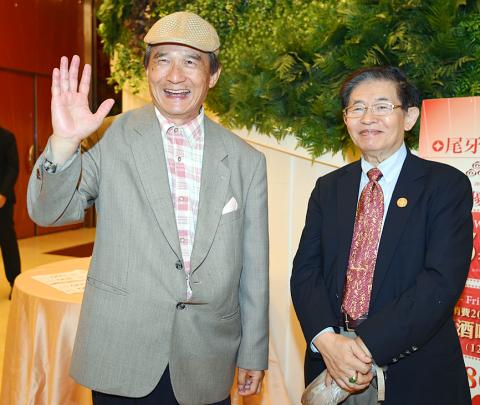Former minister of national defense Michael Tsai (蔡明憲) yesterday said that from his recent talks with former US national security official Stephen Yates, it can be surmised that the new US administration to be headed by president-elect Donald Trump will reassess Taiwan-US relations, which could lead to a major breakthrough in official ties between Washington and Taipei.
Tsai made the remarks in an interview with the Central News Agency, adding that he and Yates are old friends and they met last week for informal talks when Yates was visiting Taipei.
Tsai, who was Taiwan’s deputy representative to the US and deputy secretary-general of the National Security Council, said Yates predicted that the Trump administration will reconsider Washington’s international relationships, which includes US-China and Taiwan-US ties.

Photo: Liao Chen-huei, Taipei Times
“Trump has placed a priority on US interests, therefore opportunities are opening up to broaden ties and exchanges between Taiwan and the US,” Tsai said.
Noting that the US Senate and Congress recently approved the National Defense Authorization Act for the coming year — which is to be implemented when it is signed into law by US President Barack Obama before his term expires — Tsai said that it will be the first time that senior military officials can legally host reciprocal visits and exchanges between Taiwan and the US.
Therefore, when Trump is inaugurated as US president next month, this law would promote major breakthroughs in official ties and exchanges between Taiwan and the US, Tsai said.
He recommended that Taiwan’s foreign affairs institutions lobby Washington for more changes.
Trump has said that he would put the interests of the US first, which would help promote and adjust the Taiwan-US relationship, Tsai said.
“Just as Trump wrote on Twitter that he spoke with the president, so must we take the initiative when these opportunities present themselves,” he said.
Tsai said President Tsai Ing-wen (蔡英文) and foreign affairs officials should lobby Washington to change the name of the de facto consulate in the US to the “Taiwan Representative Office.”
Taiwan’s representative office in Washington is called the Taipei Economic and Cultural Representative Office.
“This move would be opposed by China. We must not sit back and do nothing just because China is against it,” Michael Tsai said.
“It is important to convey the needs and wants of Taiwanese to the US. If we do not stand up on the representative office issue, then the US will not even consider it,” he added.
Chen Chien-jen (程建人), former foreign affairs minister and former representative to the US under the Chinese Nationalist Party (KMT) government, yesterday said that “Taipei” was chosen instead of Taiwan for the representative office name when the US broke official diplomatic ties with Taiwan in 1979 to “avoid indicating any sense of Taiwanese independence at the time.”
“However, I do not believe lobbying for a new name is an urgent matter,” Chen said. “Right now Taiwan needs to steadfastly push forward our foreign affairs policy. It is most important to maintain cross-strait peace and security, and enhance our relationship with the US.”

CHAOS: Iranians took to the streets playing celebratory music after reports of Khamenei’s death on Saturday, while mourners also gathered in Tehran yesterday Iranian Supreme Leader Ayatollah Ali Khamenei was killed in a major attack on Iran launched by Israel and the US, throwing the future of the Islamic republic into doubt and raising the risk of regional instability. Iranian state television and the state-run IRNA news agency announced the 86-year-old’s death early yesterday. US President Donald Trump said it gave Iranians their “greatest chance” to “take back” their country. The announcements came after a joint US and Israeli aerial bombardment that targeted Iranian military and governmental sites. Trump said the “heavy and pinpoint bombing” would continue through the week or as long

TRUST: The KMT said it respected the US’ timing and considerations, and hoped it would continue to honor its commitments to helping Taiwan bolster its defenses and deterrence US President Donald Trump is delaying a multibillion-dollar arms sale to Taiwan to ensure his visit to Beijing is successful, a New York Times report said. The weapons sales package has stalled in the US Department of State, the report said, citing US officials it did not identify. The White House has told agencies not to push forward ahead of Trump’s meeting with Chinese President Xi Jinping (習近平), it said. The two last month held a phone call to discuss trade and geopolitical flashpoints ahead of the summit. Xi raised the Taiwan issue and urged the US to handle arms sales to

State-run CPC Corp, Taiwan (CPC, 台灣中油) yesterday said that it had confirmed on Saturday night with its liquefied natural gas (LNG) and crude oil suppliers that shipments are proceeding as scheduled and that domestic supplies remain unaffected. The CPC yesterday announced the gasoline and diesel prices will rise by NT$0.2 and NT$0.4 per liter, respectively, starting Monday, citing Middle East tensions and blizzards in the eastern United States. CPC also iterated it has been reducing the proportion of crude oil imports from the Middle East and diversifying its supply sources in the past few years in response to geopolitical risks, expanding

Pro-democracy media tycoon Jimmy Lai’s (黎智英) fraud conviction and prison sentence were yesterday overturned by a Hong Kong court, in a surprise legal decision that comes soon after Lai was jailed for 20 years on a separate national security charge. Judges Jeremy Poon (潘兆初), Anthea Pang (彭寶琴) and Derek Pang (彭偉昌) said in the judgement that they allowed the appeal from Lai, and another defendant in the case, to proceed, as a lower court judge had “erred.” “The Court of Appeal gave them leave to appeal against their conviction, allowed their appeals, quashed the convictions and set aside the sentences,” the judges